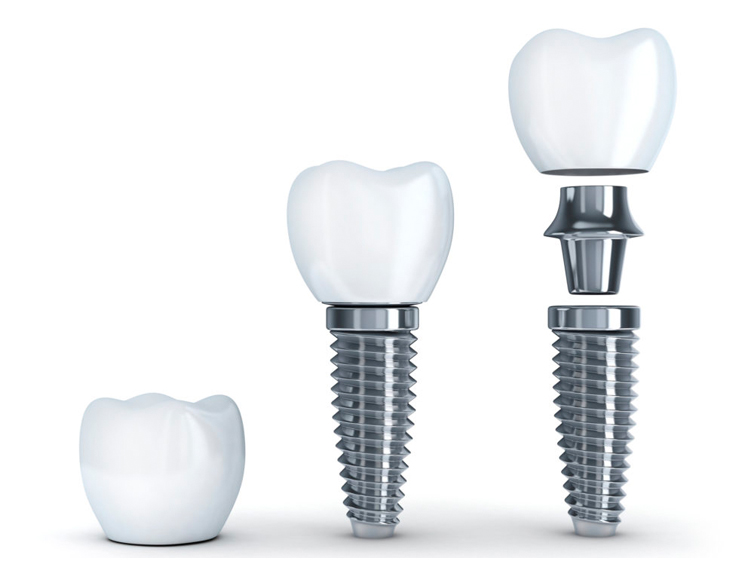
Dental Implants
Dental implants are changing the way people live. If you want replacement teeth that look as good, feel as good, and function as well as natural teeth, then you want dental implants. Our office provides revolutionary dental implant technology that allows you to eat and smile with confidence.
Dental implants are small titanium screws that are placed into the jawbone to create a permanent new root. A natural tooth coloured crown is then placed over the dental implant. The dental implant is surgically placed in the jawbone and functions as an anchor for the replacement tooth. After bonding is formed between the jawbone and the dental implant, the implant can then firmly support a crown, bridge or denture.
Are you a candidate for dental implants?
Generally if you are healthy enough to have regular dental treatment you are suitable to have dental implant surgery, you would however need a full assessment to ensure you have enough bone to place one and also that your oral hygiene is of a very high standard; we can help you achieve this.
People with health conditions such as uncontrolled diabetes or heart disease or who have received radiation to the head and neck, along with heavy smokers will need further special considerations.
What you can expect
The entire process can take months from start to finish. Much of that time is devoted to healing and waiting for the growth of new bone in your jaw. Depending on your situation, the specific procedure done or the materials used, certain steps can sometimes be combined.
The Dental Implant Process
The dental implant process can be summarized in five basic phases:
The Planing Process
Planing >>> Sugery >>> Healing Osseointegration >>> Final Restoration >>> Care and Maintenance
1. Planing
Planning for dental implants can be done in several steps.
- Initial consultation: a general discussion of your goals and the treatment options available.
- If you decide to work with us, we will schedule a more comprehensive consultation to determine whether you're a good candidate for dental implants which includes a complete dental exam to determine your oral health.
2. Surgery
Depending on your condition and treatment plan, you may have one surgery or a series of surgeries.
- Damaged tooth removal ,when needed
- Jaw preparation: The next step is preparing the jaw for implantation. If your jawbone isn't thick enough or is too soft, you may need bone grafting before you can have dental implant surgery. The condition of your jawbone determines how you proceed.
- Placement: The third step is installing the implant. After the hole is drilled into the jawbone, the screw is placed and then the implant is connected to the screw.
3. Healing and osseointegration : Waiting for bone growth
Next, your implants will be allowed to heal. This is when they integrate with the bone and become fully fixed like your natural teeth.
The next stage of the process is healing. The day of your dental implant surgery, you will want to rest. Healing also involves your body building bone around your dental implants, a process known as osseointegration. This process, which can take several months, helps provide a solid base for your new artificial tooth - just as roots do for your natural teeth. During this period, your dental implants are at their most vulnerable. It's critical that you follow all your postoperative instructions.
4. Final restoration
Once your implants are fully healed, we will place your final restorations.
When we talk about dental implants, we are often referring to the entire tooth replacement, but technically the implant itself is only the root part.
With advanced technology, we can make highly attractive restorations that are also durable. No matter how many teeth you've lost and where they're located, dental implant restorations can give you back your beautiful smile. Once your restorations are placed, we will check to ensure your bite is still healthy and won't put adverse pressure on the implants.
5. Care and maintenance
Dental implants can last years, decades, even a lifetime, if they're properly cared for. Keep in mind that these hygiene habits are crucial to preserving the health and strength of your natural teeth as well.
Care: The following is a list of tips on caring for your dental implant post-operation.
- Eat soft foods that are of a mild temperature. (i.e. yogurt, soup (warm not hot) etc.)
- Light exercise such as walking and yoga can be resumed as soon as 3 days. Higher intensity physical activity should wait until a week after surgery.
- Swish with salt water to keep the wound clean and to avoid infection and reduce swelling.
- Make sure to follow the dentist's instructions and take any medications that are prescribed to you, even if they are just over the counter.
- Use an ice pack on the area of the jaw to help reduce pain and swelling.
Maintenance is an important part of the dental implant process. Once you've got your implants, take proper care of them and they can last you a lifetime.
- Treat them like your natural teeth: brush, floss, and make regular dental visits
- Every 6 months visits for check-ups and professional cleanings
- Avoiding some bad habits: smoking and using your teeth as tools that can damage implants as well as teeth
This page describes the care in general. Your dentist will provide you with clear instructions. Be sure to follow the directions and if you have any questions, please call us 03-7646-788.